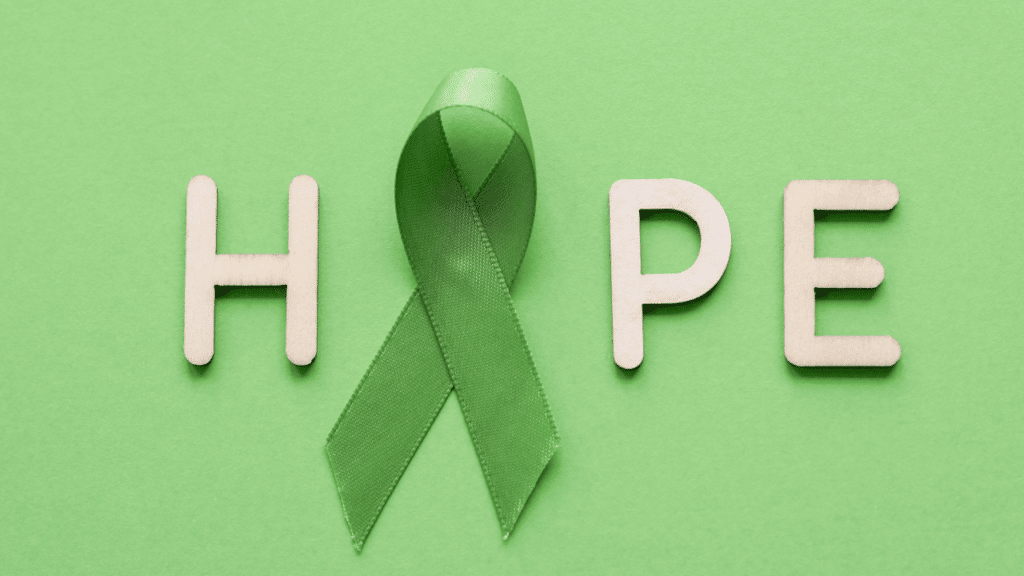Updated May 2021

There is a quote by businessman and motivational speaker Nido Qubein that says, “Your present circumstances don’t determine where you can go, they merely determine where you start.” With that in mind, May is mental health awareness month. It’s time to look at where we currently are with the stigma of mental health in the world and start pushing forward to where we want to go.
While Mental Health Awareness Month takes place each May, 2021 feels a little different. The statistics point to the fact that we’re on the brink of a mental health crisis all around the world due to the pandemic and tension from the past year.
Before we get started, if you’re struggling and need help, I encourage you to look at for hotline and website details that can help: Where to Find Mental Health Help IMMEDIATELY / A.S.A.P.
What is mental health?
This is the 70th year that Mental Health America has promoted and supported May as Mental Health Awareness Month. And since we like to use colors to show our support and spread awareness about different medical conditions, people wear green ribbons for mental health.
But before we can really spread awareness about mental health, we need to understand what it is exactly. The MentalHealth.gov website defines it this way:
“Mental health includes our emotional, psychological, and social well-being. It affects how we think, feel, and act. It also helps determine how we handle stress, relate to others, and make choices. Mental health is important at every stage of life, from childhood and adolescence through adulthood.
When many people think of mental health they think of the term “mental illness”. This term is being replaced by phrases like “mental health challenges”. There is a horrible stigma that surrounds the words “mental illness” that causes those struggling to experience shame that gets in the way of them getting the help they need.
Many people also think that “mental health” only applies to those with disorders such as schizophrenia. They instantly think of the movies Sybil and A Beautiful Mind. What they don’t think of is their neighbor, co-worker, pastor, or best friend. However, the truth is there are people who are struggling with mental health challenges all around you.
Why mental health awareness is so important
Remember when no one would talk about breast cancer? It was a taboo thing. It’s not that people didn’t know it existed, they just didn’t want to talk about it. How did we go from that to a day where everyone knows that pink stands for breast cancer and even professional and college athletes sport pink shoes and ribbons during games to spark awareness for the disease?
It happened because people started to spread awareness about the disease. I’m sure you’ve heard the name Susan G. Komen. The only reason you know her name is because when she was dying of breast cancer, her sister made a promise to her that she would do everything she could to end the disease. Women started being willing to share their stories.
This led to others realizing that breast cancer was a more widespread problem than they had realized. When that happened more women started coming forward and society started to realize that there needed to be a change. Now millions of dollars have been raised for finding a cure. Something that never would have happened without breast cancer awareness.
This is why we need mental health awareness.
Mental health challenges, like suicide claims, live every day. Yet you don’t see people wearing green ribbons. There are people all around who are struggling with things like anxiety and depression, but there aren’t teams of athletes wearing green shoes. And there are people who are struggling with serious mental health challenges every day who are too afraid to get the help they need because of the stigma that surrounds mental health.
This is why mental health awareness is so important.
The more we talk about mental health and share our personal stories, the more others will become aware. They will begin to see that there are people with mental health challenges all around them. Then they will learn more about it, which will help us put an end to the shame and fear that the stigma creates, just like people have done for breast cancer.
Things you can do to improve your mental health
Do things you enjoy and spend time with friends
Many times we lack the desire to do things when we are struggling with mental health. People with anxiety and depression tend to withdraw from their family and friends. It’s also easy to give up hobbies and activities that you normally enjoy. Everything seems like it takes so much work and it doesn’t always feel worth making the effort.
However, the more you withdraw, the easier it becomes to do nothing. This is why you need to go spend time with friends and participate in the hobbies that you used to enjoy even if you don’t “feel” like doing it at the moment. It’s good for your mental health.

Watch what you eat
Your food matters. You can’t expect to fill your body with junk and feel good. Our bodies are connected physically and mentally far more than most people want to admit. Try to eat a balanced diet and don’t overdo it on any one thing. Remember that moderation is key. It’s okay to eat the cookie, just don’t empty the cookie jar.
Take your medication
If you’re on prescription medication for your health, then take your medicine. It doesn’t matter if it’s for your physical health or mental health, it’s all important. It’s also important that you follow the directions when taking it. Make sure you get the right dosage at the right times.
If you are on a medication that you no longer want to take, make an appointment to discuss alternatives with your doctor first. Do NOT just stop taking the medicine on your own.
Get some exercise
I know people get tired of being harped on for not exercising enough, but there’s a reason it’s pushed so hard. Exercise really is good for your mental health. It helps to boost your mood by releasing endorphins in your brain. It’s also a healthy way to take out anger and frustration.
And remember, exercise doesn’t have to be lifting weights or something intense. It’s just good to get moving. You could go for a walk or try out yoga. Look for what works for you.

Get the rest you need
This means going to bed when you need to and waking up when you should. Getting too much sleep on a regular basis isn’t any better than not getting enough sleep. When you’re struggling with mental health, you might want to stay in bed all day, but that doesn’t mean that you should.
Journal
Keeping a journal is a great way to process your thoughts and get them out of your head. It’s a safe place to open up about the things that you are struggling with. And if you keep a gratitude journal, it can be a valuable tool to look back on during the rough days.
Get professional help
If you’re struggling with your mental health and haven’t talked to a doctor or mental health professional about it yet, make an appointment. A licensed therapist can help you determine the right path and combination of treatments that can help you. Mental health challenges are treatable and it’s easiest when they are caught and treated early on. If you feel like things are out of your control, talk to a professional.
How to support the mental health of others
Maybe it isn’t your own mental health that you are concerned about. You can make a difference for your friends and family members who are struggling. You can also make a difference in the lives of people that you don’t even know by helping to spread mental health awareness and working to put an end to the stigma that surrounds it.
Tips for helping family and friends
If you have a friend or family member who is struggling with mental health challenges, the first thing I want you to know is that it’s not your job to “heal” them. And honestly, they probably aren’t looking for you to do that anyway. So many people get caught up in thinking that they need to “fix” other people when that’s not their job at all.
Instead, focus on letting them know that you are there for them and an ear that will listen. Many times people aren’t looking for someone to tell them what to do, they just want to know that they have a friend who will be there for them. You can be this person! Here are a few things to remember:
- Don’t judge anyone. We all have our own issues.
- If you don’t understand what they are going through, then don’t say that you do.
- Do not break their trust. If they are sharing something with you in private, don’t tell anyone else about it. The one exception is if they are having suicidal thoughts and you need to get them help.
- Check in on them. Don’t wait for them to contact you.
- If you ask them how they are doing and they say “fine” or “good”, then ask them how they are really doing. Let them know you want the real answer, not the fake answer they think you want to hear.
- Look for ways to encourage them or show that you are thinking about them.
- Just listen. Really listen…actively. Don’t pretend to listen while thinking about something else. It can be hard to share personal things and if they find out you aren’t really listening, they aren’t going to open up to you again.
- Don’t do or say anything that implies you think they need to “just get over it”.
- Use “I” statements when you are speaking to them instead of “you” statements.
How to spread mental health awareness
Many of the tips above will also work great when talking to someone that you don’t know personally. However, if you are looking to help spread mental health awareness overall, here are some things you can do:
- Share your own mental health story. If you have ever struggled with your own mental health, start speaking up about it. The more people we have sharing their stories, the more others will be able to see that they aren’t alone. This also helps those who don’t struggle to realize what a widespread problem we have surrounding mental health in our world.
- Learn about mental health. We need more people who are educated on the topic of mental health to speak out about it. This doesn’t mean that you need to enroll in college and get a degree. Just read a few books, sign up for a newsletter, or start following mental health organizations online.
- Bring a mental health speaker to your community. You could bring them into your schools, your church, your neighborhood, or your city overall.
- Support a nonprofit. There are many nonprofits, like NAMI (National Alliance of Mental Illness), that are working hard to end the stigma and make sure that everyone gets the help they need.
- Stop feeding the stigma. Take a moment to think through your beliefs about mental health. Is there anything that you need to stop believing?
Mental health awareness starts with educating yourself and others
Supporting people and their mental health and emotional wellness is my passion. Because of that, I’ve created several resources to help. Here are a few ways you can educate yourself and the people on your team:
- Transforming Stigma: How to Become a Mental Wellness Superhero. I truly believe that the advice and experience I share can be helpful to anyone. If you are struggling with your mental health, I can relate. I share my experience with advice and encouragement to help you in your struggles. If you have a family member or friend who is struggling, there is information to help you understand and tips on how to support them.
- Ignite Mini-Course – Move from surviving to thriving in 7 days by learning to create a self-care routine for your life.
- The Ultimate Guide to Self-Care – The Ultimate Guide to Self-Care walks you through creating a self-care routine with actionable steps that deliver life-changing results.
- The 30-Day Self-Care Plan – Refresh, renew, and recharge your mental and emotional health with The 30-Day Self-Care Plan.
Imagine a day when people will speak openly about their own mental health challenges, those who need help will have it, and society will lend an ear and offer support. I believe that if we work together and continue spreading awareness, this day will come.


